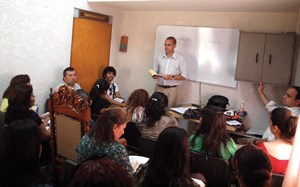Thousands of students across Latin America are studying the Moore College correspondence course in Spanish, with exponential growth even in countries deeply hostile to Christian ministry.
 Peter Sholl (pictured right), CMS missionary with his wife Sarah in the violence-torn Mexican city of Monterrey, is the Director of MOCLAM - Moore College in Latin America.
Peter Sholl (pictured right), CMS missionary with his wife Sarah in the violence-torn Mexican city of Monterrey, is the Director of MOCLAM - Moore College in Latin America.
Taking up the reins in 2009, he says that the course’s popularity is due to its clarity and deep commitment to teaching the Bible. But the course also cuts across denominational boundaries in a denominationally ‘rigid’ environment, and comes with Australia’s reputation for providing quality education.
MOCLAM began with the work of Australians Grahame and Patty Scarratt in Chile, but exams for the correspondence theology course are now being sat by over almost 3000 students in fifteen countries.
Sometimes a handful of people in a church will be studying the course, sometimes IFES student groups, sometimes entire networks of pastors and church leaders within denominations.
The course has unexpectedly flourished in one of the most restricted nations for Christian ministry in Latin America. In that country, 1000 students study the course from a group of fifteen that started in 2007. Peter trains pastors there to teach the course in their own churches.
‘In one little Baptist church in the capital, they have sixty people on Tuesday nights studying subjects,’ he says.
The growth has been so dramatic that the Australian-based markers have struggled to keep up, and locals are being trained not only as teachers but exam markers.
Life under fire in Monterrey
But with the rapid growth of the courses across the continent, the Sholls have faced a complicated situation in their base, Monterrey. The northern city was rated Latin America’s safest in 2005, but has since become an epicentre of violence between rival drug cartels. Shootings, beheadings, and attacks on civilians have become common.
In a seminar at CMS Summer School, Peter shared his ambivalence about deciding whether to stay or go. The threat of violence is real and confronting.
‘I wrote a series of articles on the security question [looking at Paul in Acts] – cause Paul sometimes leaves, sometimes goes, but usually, he goes because the locals tell him to go,’ he says. ‘So we’re really keen to be talking to the locals about when they think we should go – how else do you know?’
But on the other hand, everyday life in Monterrey is not always sensational, and staying means plenty of opportunities for witness.
‘Quite a few people have made comments about how they value us, and how they value what we’re doing, particularly in the context of what is going on around the city,’ he says.
‘They are blown away when they hear that there are people in Australia praying for us, and praying for them because they know them through us.’
Feature Photo: Scott Clark





















